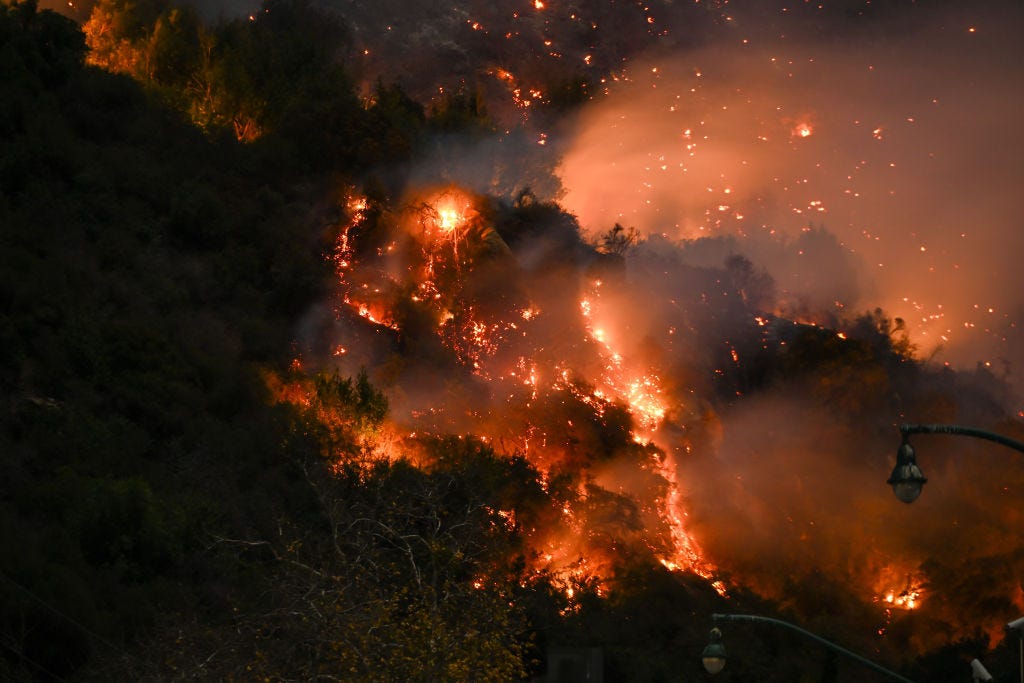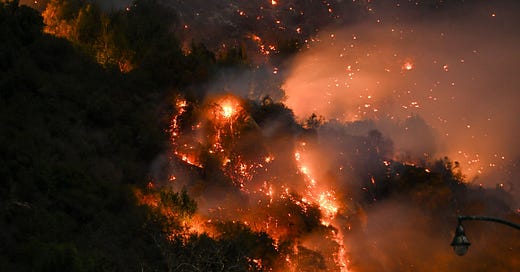Last year my best friend’s parents lost their house in a fire. Since then we’ve talked a lot about what it feels like to lose your home like that, how devastating and disorienting it is, like you’re stuck in a bad dream, like you’ve lost more than just your shelter full of stuff, but your entire world, your memories, your sense of place and self. When she recovered her journals in the remains, she texted me amazing excerpts from an old college essay—cringey, try-hard, perfectly pitched for being 19 with big dreams—and it felt like she’d received the greatest gift that day, to remember something so silly yet formative. That was just one tiny surviving relic among thousands of others lost.
The scale of the fires in LA feels incomprehensible. It’s already unthinkable to lose your home in a fire, imagine losing your entire neighborhood, your entire hometown. I keep imagining what it would feel like to walk up to my building in Brooklyn and find a pile of rubble, then look around and find miles of burned out empty blocks, the schools and restaurants and libraries all gone too. I keep trying to conjure the little moments: how people decided what to take with them in a rush, what it felt like to drive away, or drive back. I keep wondering how people will get in touch with their neighbors—the ones whose numbers they don’t have but who kind of feel like family anyway. How to be a good neighbor when you no longer have a home? I think about the years and years of rebuilding ahead, of traumatic flashbacks, of remembering little lost things.
When I text friends about the fires, language feels useless. You can only type insane so many times, and anyway the word loses meaning when you say it every other day about any stupid thing. But I keep coming back to this notion of the destruction feeling incomprehensible, and my desire to comprehend it. My knee-jerk response is to say it isn’t possible, that it’s too big and too sad to wrap my head around. Then I wonder if that’s a copout. I’ve had this conversation with myself a lot over the last year about the genocide in Gaza too, as I cycle through periods of looking at the details then avoiding looking, and I always end up back at the question of what I owe my attention to, and why. Sometimes the urge to stare—to make a spectacle of people’s suffering, as the 24-hour news cycle so often does—feels just as wrong as the urge to look away.

It feels obscene to compare the genocide to the fires, except for the fact that they’re both the result of nihilistic profit motives and their consequences (imperialism, climate change), which is no small connection actually, although the differences are starker. In multiple news casts I’ve heard reporters or witnesses refer to Altadena or the Palisades as “looking like a third world country.” We’re so used to seeing destruction in the countries America has fucked with that we categorized them and made that category a synonym for destroyed. I wonder what it means that, for once, a full-scale disaster has hit the wealthy, or if that still won’t be powerful enough to inspire change. When Trump said “drill, baby, drill” last week while LA was literally on fire, the latter seemed more likely.
The impulse to imagine my own apartment burning is probably an attempt to counteract how powerless I feel. I want to believe that if I can feel the pain of those suffering that I’ll be adequately galvanized to do what’s necessary, but then I endlessly debate what that is and go back to feeling powerless. There’s a run-in Avi and I have a lot in these moments, between my instinctive turn towards personal responsibility (no more two-day shipping and single-use plastic! or whatever) and his insistence that what we need is a movement, then my rebuttal that we can’t just wait around, and his rebuttal that we aren’t. Ultimately we both believe in what the other is saying—neither of us are prone to doom—we’re just processing it differently. I find that tension useful actually. I’m working on not taking my reactions immediately at face value, but staying curious about them.
On that note, I’m not here to declare or conclude anything. It’s too soon, LA is still in crisis. But I thought I’d ask where your head’s been this week—how you process faraway atrocities, how you reconcile the need to look with the need to look away, what you’re hoping for, what you’re afraid of, what you find yourself fixating on in times like these. Also, are you ok? If you need help, please feel free to keep sharing information and links in the comments. Thanks to those who sent along resources in the comments of 15 things on Friday, like this masterdoc of GoFundMes, volunteer opportunities, and mutual aid programs. It’s amazing how quickly people have organized.
Two articles I’ve appreciated on the fires so far (although I expect better/more thorough ones this week) were “The Los Angeles Fires Didn’t Have to Be This Bad,” by Ben Burgis for The Jacobin and “Yes, We Need To Call Out The Climate Criminals Right Now,” by Nathan J Robinson for Current Affairs. Last Friday’s 15 things also included an unexpected amount of mid-century art, an amazing gift-giving strategy for limiting consumption, the best, long-lasting winter gloves, and more.
On the podcast this week, Danny and I will be answering six reader questions about a cringey drunken exchange, when your husband gives you the ick after 15 years, moving in with your partner, when your parents dislike your boyfriend, a sexless relationship, and falling in love with unavailable men. Form to submit your own questions are at the bottom of every Maybe Baby email.
Sending love to you all,
Haley





I’m a public defender, so I deal with people in crisis nearly every day. I do think experiencing a loss of everything is a human experience that has been extremely common for all of human history - and that our relative insulation from it is a reflection of privilege and the effects of capitalism and liberalism too. There are people experiencing this everywhere - all the time. And the fact I’m sitting comfortably in my home is BECAUSE other people are in crisis, not despite of it.
And yet we keep moving. I don’t think humans will change in that we will ever be able to avoid the emotions and motivations that cause this loss and destruction. But we can do better to infuse empathy and community in our day-to-day lives.
The movement versus individual action discussion is one I have a lot with my coworkers, because there are a lot of arguments our assistance to individuals is actually contrary to a movement based approach. But I believe we need both. And more than both, we need to fundamentally restructure the way we think about that discussion. Social justice is a mindset, an approach, an inability to accept less, rather than any specific action or decision. If not looking away gives you energy to volunteer, donate, or participate in community movements, great. If looking makes you exhausted and drains you (I feel this away about the news, personally), then figure out what you need to participate.
Haley, I think you do a great job creating a space for thinking about these issues, and that’s a great contribution to movement building in and of itself!
LA baby here (I am okay & still have my home & am INCREDIBLY fortunate and grateful) - I think the most staggering, humbling check for me this week is what happens when you don’t have a choice of “what is my responsibility to look at this vs protect my sanity and look away?” This is absolutely no fault of anyone who doesn’t live in Los Angeles - just deeply noticing how my relationship to “far away disaster” is forever changed. I have found myself struggling to find ways to distract and cope this week, because when I turn to familiar publications or podcasts or entertainment etc, I just cannot relate to anyone who has the option to turn off the horrors of what is happening and just go back to the routine of their daily life.
There is no choice. My city is burning all around me. The effects on the nervous system of a constant drill of hyper vigilance, not to mention the overwhelming grief, is something I don’t think I’ll ever be able to put into words and is something I am only beginning to process as a thread of a connection to others who have been through similar, and much worse and lengthier and deadlier, situations.
Again, deeply humbled by my privilege and will continue to integrate this experience and how it has pulled away more layers of the facade of protected American otherness. I wish I could put a more coherent and examined thought together, but for now that’s all my stress fried brain has got. So much love to my LA neighbours and everyone affected!! ❤️❤️